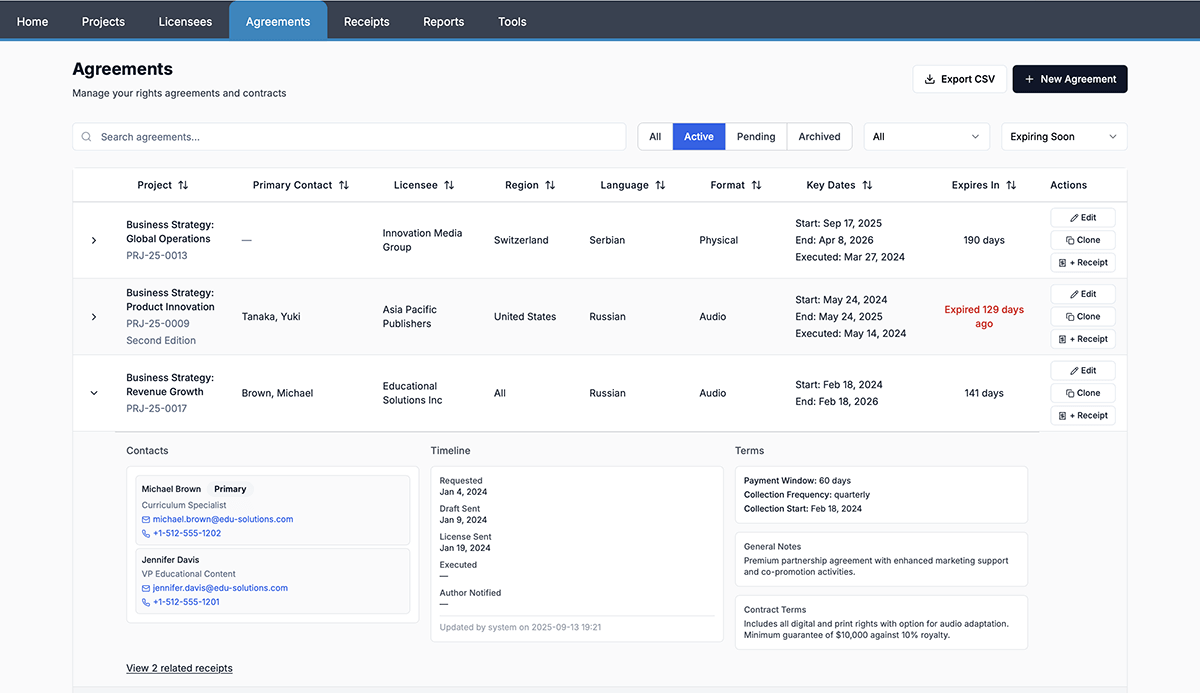Choosing the Best Rights Management Platform for Your Business
Choosing a rights management system can feel overwhelming at first, but it doesn’t have to be that way. In this FAQ, you’ll learn exactly how rights management platforms work, what features matter most, the challenges to watch for, and the practical steps to select and implement a solution that truly fits your workflow and empowers you to maximize all your licensing opportunities and revenue.

What is a rights management platform?
A rights management platform is a tool that helps companies that own and/or license intellectual property keep track of all their licensing contract terms and related financial transactions. With this information readily available, rights professionals have transparency into what rights they own, what they have sold and still have available to sell, what they need to renew, and their anticipated and actual rights-related revenue.
What are the common uses of a rights management platform?
Publishers and other IP-centered businesses frequently use these platforms to:
- Assess their rights portfolio: what they own, what they have sold, what they still have available to sell, and what they need to renew.
- Quickly identify and act on rights sales opportunities.
- Assure compliance with existing rights agreements.
- Ensure they are being paid for all the IP they have licensed out.
- Analyze data to understand trends, pricing, and performance, and to optimize future deals.
- Free up team members from administrative duties, so they can focus on performing more strategic work and executing new licensing deals.
What are the key functions and features of a rights management platform?
The platform should allow users to:
- Maintain an accessible and well-structured database of all the IP they have rights to.
- Record and reference agreement terms and status for both “rights in” and “rights out” licensing deals.
- Store contact and other information about their licensees.
- Track payment receipts and identify missing payments.
- Pass receipt information into a royalty management system.
- Generate reports that provide insights into unpaid advances, past due agreements, expiring agreements, and other critical business information.
- Customize variables such as languages, regions, formats, and revenue types.
- Manage all types of rights, including translation, film, audio, and merchandising.
- Easily cross-reference and search through all the data in the system, including instant searches by language, format, and/or territory.
- Integrate with other business systems, such as royalty management tools.

What are the core challenges of a rights management platform?
- Data hygiene: A platform is only as good as the data that it holds, so the system must make it simple to import and enter data without errors. Its users must be committed to maintaining accurate, updated, and consistent information.
- Variable needs: Not all companies use the same language to describe rights transactions. Companies structure agreements in different ways, with regions, formats, and other variables being organized and named uniquely. Meanwhile, new types of rights deals continue to emerge as new formats and platforms arise. The system needs to allow for all these variations.
- Interoperability: To be efficient and useful, the platform must integrate with other business systems, especially royalty management platforms.
What are the benefits of implementing a rights management platform?
Implementing a rights system provides both quantifiable financial benefits and operational and strategic benefits. A 2017 report published by the Book Industry Study Group, titled, “Positioned for Growth: The Return on Investment in Rights and Royalty Management Solutions,” identified multiple “ROI buckets,” including:
- Identification of new licensing opportunities.
- Data analytics and insights that enable more lucrative deals.
- Increased staff productivity and deal capacity.
- Improved payment tracking and collections.
- Avoidance of unnecessary licenses.
- Legal risk reduction.
- Enterprise value enhancement via greater understanding of the monetization potential of IP portfolios.
How do you choose the best rights management platform?
When choosing the best platform for your business, it’s important to consider:
- Features and functionality: Does it include all the key features outlined above?
- User interface: Is it intuitive to use? How much training will new users require?
- Customer service: How quickly does the company respond to questions and requests? What do their current customers say about their onboarding and support services?
- Scalability and flexibility: Is the system designed to evolve and scale with you as your company grows?
- Company track record: Does the company have customers like you? How long have they been serving your industry? Is this type of software a key area of focus for them, or a side project?
What are the best practices for implementing a rights management software platform?
A successful implementation depends on clear planning and stakeholder engagement. Best practices include:
- Conduct a rights audit first: Consolidate contract and rights data before migration.
- Start with a phased rollout: Pilot the platform with a subset of projects or licenses before full deployment.
- Engage cross-functional teams: Include legal, finance, sales, and IT teams early in the process to align requirements.
- Train users thoroughly: Provide ongoing training to ensure consistent data entry and usage.
- Integrate early: Connect the platform with royalty and other business systems from the start to maximize efficiency.
- Monitor and refine: Review usage metrics and feedback regularly to improve workflows and ensure adoption.
Are you ready to consider a new rights management platform?
If your organization is struggling with scattered rights data, missed licensing opportunities, or inefficient admin processes, it’s time to explore how MetaComet® Rights can help you gain full control of your contracts and revenue streams.
Contact MetaComet® today to schedule a discovery meeting and see how our platform can empower your team to manage rights with confidence and clarity.

David Marlin is the President and Co-Founder of MetaComet® Systems, a prominent provider of royalty automation tools. Since founding the company in 2000, David has spearheaded the development of a suite of best-in-class systems that effectively facilitate royalty processes for nearly 200 publishers. David has also served as the chair for The Book Industry Study Group’s Rights Committee and Digital Sales Committee.
Before establishing MetaComet Systems, David served as a technology consultant for renowned publishers, collaborating with notable companies such as Random House, Penguin, HarperCollins, Holtzbrinck, Macmillan, Scholastic, Time Warner, and many others. David holds both an MBA and a BA from Columbia University in New York.
Contact Us
"*" indicates required fields

